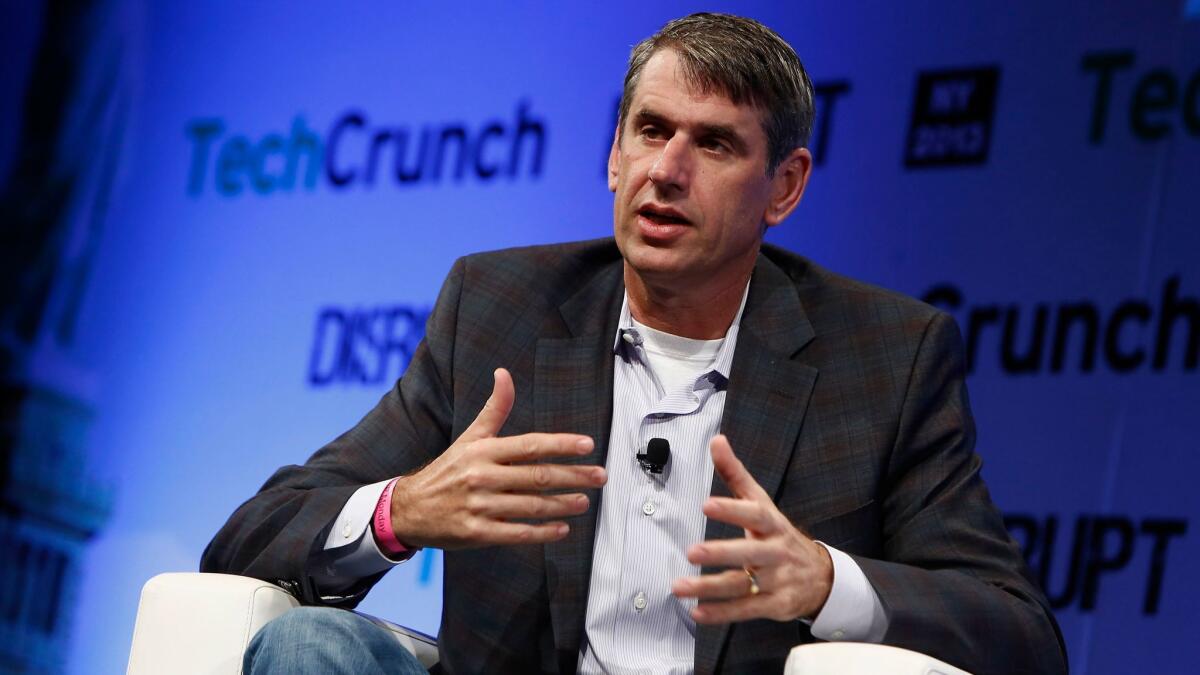Uber board member Bill Gurley resigns after leading effort to remove CEO Travis Kalanick

Bill Gurley, a venture capitalist whom sources said led the push to demand the resignation of Uber Chief Executive Travis Kalanick, stepped down late Wednesday from his role at the company too.
Gurley is being replaced immediately by his colleague, Matt Cohler, on the ride-hailing app maker’s board of directors, according to a spokesperson for their investment firm Benchmark. Uber declined to comment.
Gurley’s resignation from the Uber board comes at a tempestuous time for the San Francisco company as it tries to recover from a string of scandals that led to Kalanick’s resignation on Tuesday. Benchmark led a minority investor bloc that controls about 40% of Uber’s shareholder votes in arguing that Kalanick couldn’t shake his aggressive management style or be the one to reshape the company’s culture.
It’s not unusual for activist investors at publicly traded companies to resign their board seat following whatever campaign they were carrying out, whether successful or not. But with Uber being a private company, and thus subject to different rules, Benchmark will retain the seat, albeit with a different representative.
One of the nation’s best-known private investment outfits, Benchmark has amassed a large stake in Uber since first leading a $11-million financing into the start-up in 2011.
For comparison, the Bay Area firm made a similar investment in Snapchat maker Snap Inc. and held a 12.7% stake, which was valued at more than $1 billion, going into the Los Angeles start-up’s initial public offering of stock in March. Uber is valued at almost three times what Snap was, which could reap billions of dollars for Benchmark.
But investors worry their potential gains could be wiped away if turmoil persists at Uber. Gurley’s stepping aside could be another effort to turn a new page after more than a week of contentious decisions at the highest levels of the 12,000-employee firm.
Executive turnover has been high at Uber, with the company losing its president, head of self-driving, head of business, head of engineering and its senior vice president of communications earlier this year.
After the board of directors commissioned an investigation into claims that Uber had a toxic culture and mishandled complaints of sexual harassment and discrimination, the company fired 20 employees who were found to be at fault.
When the board delivered the recommendations from the investigation to Uber’s workforce last week, board member David Bonderman made a sexist joke about women talking a lot, which resulted in his resignation later that day. Bonderman, a billionaire investor, is the founding partner of TPG Capital, which also has start-up investments in Airbnb and Spotify.
The shake-ups have left Uber in a particularly vulnerable position. The company is currently being run by 14 executives who used to report directly to Kalanick. Meanwhile, it still needs to fill a number of high-profile roles, including chief operating officer, chief marketing officer, chief financial officer, legal counsel and now chief executive officer.
Board committees are helping run many of the searches. The board now consists of:
Garrett Camp, Uber’s co-founder and chairman
Ryan Graves, senior vice president for operations
Travis Kalanick, co-founder and former CEO
Arianna Huffington, founder of Thrive Global and the Huffington Post
Wan Ling Martello, executive vice president of Nestle in South Asia
Cheng Wei, chief executive of Chinese ride-hailing app Didi Chuxing (of which Uber is a shareholder)
David Trujillo, partner at Uber investor TPG
Matt Cohler, general partner at Uber investor Benchmark
Yasir Al Rumayyan, managing director of Uber investor Saudi Arabia Public Investment Fund
Twitter: @peard33








